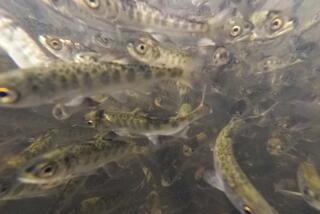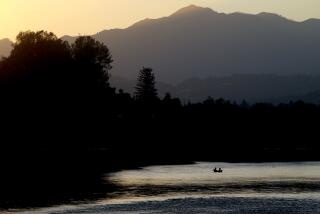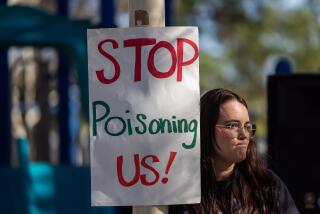Victorville compost company to monitor toxin in dead sardines
Even after they were scooped from waters off Redondo Beach, trucked across the city, hauled over the mountains and unloaded in the Mojave Desert 100 miles away, those dead sardines are still causing headaches.
The Victorville organic composting company that accepted 175 tons of fish, which expired en masse in the King Harbor marina earlier this month, must now deal with concerns that a neurotoxin found in the sardines could contaminate their prized mulch.
Dean Roberts, general manager of American Organics, said the powerful neurotoxin found in the sardines — domoic acid — should naturally degrade and disappear during the 12 to 14 weeks the fish carcasses will cook in the sun during the composting process.
But that assurance did little to stop his phone from ringing once word of the toxin hit newspapers, newscasts and the blogosphere, he said.
“It’s been a long week,” Roberts said. “People hear ‘toxic’ fish is going into an ‘organic’ facility … but it’s not really like that.”
Roberts said none of the professors, state and local environmental regulators and experts in the composting industry that he talked to expects the toxin to be a problem. Still, the company will test the mounds of dead fish throughout the composting process to check the level of domoic acid. If the toxin fails to degrade, the company will probably dispose of the compost in a suitable landfill.
The fish carcasses are stacked in six long rows on the facility grounds. The sardines have been mixed in with compost and covered with wood chips, masking any decaying fishy smell with the sweet, pungent odor found on any freshly fertilized garden.
“I’ve been told that it’s non-transferable through soil,” said Roberts, whose company brings in green waste, food waste and other organic material to compost and then sell to cities, farmers and others in Southern California. The 24-acre facility is on the banks of the Mojave River.
USC biology professor David Caron, whose laboratory found the domoic acid after testing the dead fish, said he expects the toxin, which occurs naturally in the ocean, will degrade quickly. Caron has been consulting with American Organics and will continue to monitor the toxin levels in the compost.
“It seems unlikely that there will be anything detectable in the end,” Caron said. “The toxin goes away in the real world, in the environment.”
Caron said that all the evidence indicates that the sardines died because of critically low oxygen levels in the harbor and that it is unclear if the effects of the toxin ingested by the fish contributed to their doomed, chaotic journey toward the shore.
Domoic acid is often found in the stomachs of fish that have been feeding on plankton on the ocean’s surface during toxic algae blooms. A large algae bloom recently appeared between the Palos Verdes coastline and Catalina Island, and that may be where the sardines ingested the toxin, Caron said.
More to Read
Start your day right
Sign up for Essential California for news, features and recommendations from the L.A. Times and beyond in your inbox six days a week.
You may occasionally receive promotional content from the Los Angeles Times.







